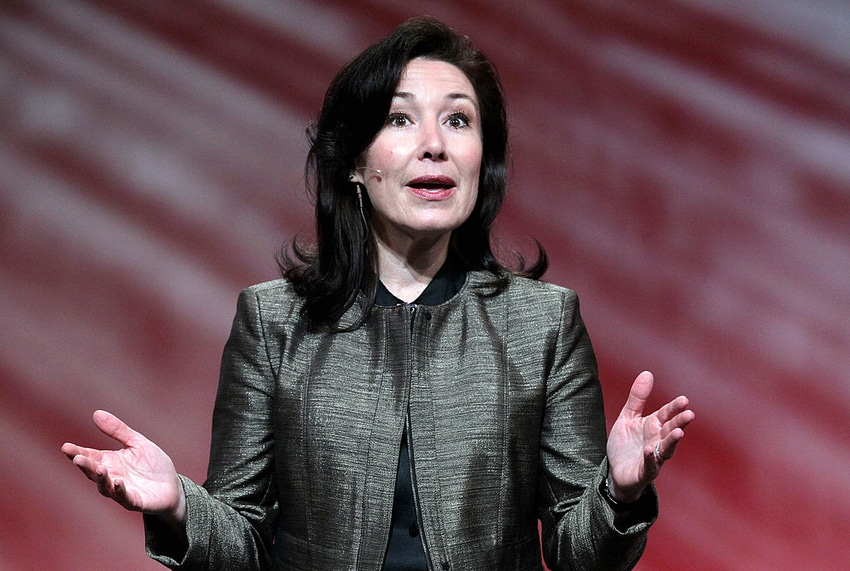As the trial continues in its second week, Oracle sought to sway the jury by calling Chief Executive Officer Safra Catz as its first witness.
May 18, 2016

By WeathersfieldTM
(Bloomberg) — Oracle Corp. Chief Executive Officer Safra Catz put an Old Testament spin on her company’s software copyright battle with Google as she told jurors about an encounter with her adversary’s top lawyer at a bat mitzvah in 2012.
“You know, Safra,” General Counsel Kent Walker said, according to Catz, “Google is this really special company, and the old rules don’t apply to us.”
“I immediately said, ‘Thou shalt not steal,’” Catz testified Tuesday. “It’s an oldie but goodie.”
READ MORE: Oracle and Google to Replay World Series of Copyright Trials
Catz’s testimony in San Francisco federal court was intended to buttress what Oracle claims was Google’s brazen theft of Java code to build its Android operating system, and to begin to explain how that theft caused the database maker damages of $9.3 billion.
As the trial continues in its second week, Oracle sought to sway the jury by calling the Silicon Valley luminary — the highest-paid U.S. female executive in fiscal 2015 — as its first witness, not unlike Google’s use last week of Eric Schmidt, the company’s former CEO and now the chairman of parent company Alphabet Inc., as its initial witness.
Catz’s message: Google co-opted Java and ate Oracle’s lunch by developing Android into the operating system now used in 80 percent of the world’s mobile devices.
‘Run Anywhere’
Google took a language designed to “write once, run anywhere” across different computing platforms and “forked,” or split into two, Oracle’s Java community of programmers, she said.
Google lifted and employed the code so that it would only run on Android, leading smartphone manufacturers such as Samsung Electronics Co., ZTE Corp., and Motorola to adopt that platform, which the search engine company offered for free, and to cease paying Java licensing fees to Oracle, Catz testified.
Since the release of Android in 2007, “the licensing business that had always been going on was disappearing,” Catz told jurors. “They use Android instead of taking a copy of our software.”
Samsung’s license for Java has been reduced to $1 million, from $40 million before Android was introduced, Catz testified.
Central to Oracle’s bid for what would be one of the largest jury verdicts in U.S. history is its claim that Google has reaped $21 billion in profit from more than three billion activations of Android. A win for Oracle could also change how software is protected and licensed.
2012 Jury
U.S. District Judge William Alsup has told the jury it’s already been established that the Internet giant infringed Oracle’s copyrights on the code. That finding, from a 2012 jury verdict and appeals court ruling, set the stage for the current trial over whether the copying was justified under the legal doctrine of fair use.
Witnesses for Google, including Schmidt, who testified that he helped create Java while at Sun Microsystems Inc. in the 1990s, have told jurors the company didn’t need to license the the language’s application programming interfaces, or APIs, to build Android. The APIs at the heart of the lawsuit are indispensable shortcuts programmers use to work across software platforms, and to create applications for Android.
While cross-examining those witnesses, Oracle’s lawyers have hit upon a disconnect between that testimony and their e-mails while Android was being created. The e-mails showed Google executives and engineers were concerned that they needed, and failed to get, a license for Java from Sun, and after it was acquired, from Oracle. Some of the evidence shows Google was worried that failed licensing negotiations would trigger a lawsuit. Oracle filed its complaint in 2010, the year it took over Sun.
Oracle founder Larry Ellison called Java the most valuable asset his company ever acquired when that deal was announced in 2009. Ellison, who testified at the 2012 trial, was listed by Oracle as a possible witness this time around. Google last week showed jurors a brief clip from his videotaped deposition.
If jurors find Google didn’t make fair use of Oracle’s copyrights, they will decide in a second phase of the trial whether the company is entitled to damages.
The case is Oracle America Inc. v. Google Inc., 10-cv-03561, U.S. District Court, Northern District of California (San Francisco).
You May Also Like
